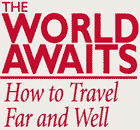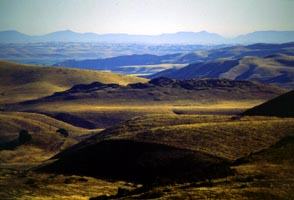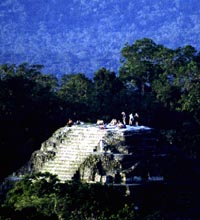|
|
| w o r l d a w a i t s . c o m |

|
It's what you're looking for... "To some extent, all travels are searches." At least, that's how I see it. Even if you're searching for a way to avoid the uncertainties of searching, you're still on a search. But what joy is there if you head off on a search and find only what you knew ahead of time you would find?
Here, at last, is the real challenge of traveling well -- for it is entirely possible to cheat yourself of the chance to discover. Countless travelers miss opportunities for revealing experience by choosing a formulaic approach, staying on the beaten path, relying on their guidebooks as though they were bibles, and otherwise insulating themselves from engaging the unknown. One of the biggest risks to the would-be discoverer is to overplan.
Although it’s impossible to go with ghost-free innocence into the world, so that all experience is fresh and revealing, the opposite is not true. It is entirely possible to wander the globe completely possessed by the abstract ghosts of preparation. The only way to exorcise your ghosts is to behave spontaneously—to trust yourself and respond to impulse." The key thing is to leave room in your plans and attitudes for spontaneity -- for impulse. The pale collection of books, brochures, web pages, and friend's recommendations you use to plan are just a bare beginning. By the time you've been traveling for a week or two, dozens of unforeseen options will have appeared. You'll meet people with stories and ideas to share. You'll find out whether that city is really worth the week you planned, or whether a month or a morning are more appropriate. You'll see a ridge that draws your hiker's eye, or hear some music that turns your artist's ear.
Another advantage: "The spontaneous threader travels with a terrific advantage over those whose itineraries are etched in stone. With an impulsive snap of mental fingers, he is able to take action and avoid the dreaded and very real malady known as “travel burnout.” That first European cathedral is awe-inspiring. By the tenth, most of your awe may already have been inspired. Add this lesser awe to the lesser awes inspired by your eighth museum, twelfth ruin, fifth government palace, and seventeenth tourist promenade, and you find yourself suffering from severe awe depletion—a.k.a. travel burnout." As you leave this Philosophy section behind to look into the more practical aspects of independent travel, remember: "You absolutely cannot see everything—so see your thing instead. And unless you are truly prescient, remember that you'll be discovering much about what “your thing” is as you go—or do you imagine as you read this that your pre-travel thoughts on what ought to be seen are the last word? Ha! Just you wait.
Thread on!" |

 "Planning a journey is like living through it before you live through it, so actually doing the thing has a slightly used feel to it. Travel plans are fated to include speculation, preconceived notions, secondhand opinion, artificially inflated hopes, and irrationally cultivated fears. Those abstractions stick with you. As you follow the plan and wander some new part of the world, there's a ghost in your mind—a ghost that can haunt...
"Planning a journey is like living through it before you live through it, so actually doing the thing has a slightly used feel to it. Travel plans are fated to include speculation, preconceived notions, secondhand opinion, artificially inflated hopes, and irrationally cultivated fears. Those abstractions stick with you. As you follow the plan and wander some new part of the world, there's a ghost in your mind—a ghost that can haunt... Indeed, you may discover that all your advance planning was an idiot's waste of time and radically change your entire purpose. So be ready for it! Don't lock yourself into a shackling set of reservations or an itinerary etched in stone. Don't make up a mental or written checklist of sights you just have to see and things you just have to do. Leave all the room you can to respond to impulse and to follow an inspired path to discovery.
Indeed, you may discover that all your advance planning was an idiot's waste of time and radically change your entire purpose. So be ready for it! Don't lock yourself into a shackling set of reservations or an itinerary etched in stone. Don't make up a mental or written checklist of sights you just have to see and things you just have to do. Leave all the room you can to respond to impulse and to follow an inspired path to discovery. Trust yourself, trust your impulses, and find your road to discovery.
Trust yourself, trust your impulses, and find your road to discovery.